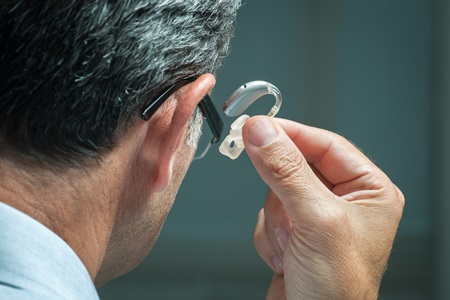Hearing Loss
Overview
Older people are the largest group affected by hearing loss. The contributors range from excessive noise to drugs, viral or bacterial infections, head injury or head tumors, stroke and heredity.
There may be many causes for age-related hearing loss. It most often occurs because of changes in the following locations:
Within the inner ear (most common)
Within the middle ear
Along the nerve pathways to the brain
Other factors that affect age-related hearing loss:
Continuous exposure to loud noise (such as music or work-related noise)
Loss of hair cells (sensory receptors in the inner ear)
Inherited factors
Aging
Various health conditions, such as heart disease or diabetes
Side effects of some medications, such as aspirin and certain antibiotics
Hearing Loss Symptoms
The following are the most common symptoms of age-related hearing loss:
Speech of others sounds mumbled or slurred.
High-pitched sounds, such as "s" or "th" are hard to distinguish.
Conversations are difficult to understand, particularly when there is background noise.
Men's voices are easier to hear than women's.
Some sounds seem overly loud and annoying.
Tinnitus (ringing in the ears) may occur in one or both ears.
The symptoms of age-related hearing loss may look like other conditions or medical problems. Always consult your health care provider for a diagnosis.
Hearing Loss Diagnosis
Your health care provider will use an otoscope, which is a lighted scope, to check in the outer ear canal and to look at the ear drum. He or she will look for damage to the ear drum, blockage of the ear canal from foreign objects or impacted ear wax, inflammation or infection.
You may be referred to a hearing specialist, an audiologist, to have an audiogram. An audiogram is a test in which sounds are played through headphones to one ear at a time. You are asked to respond if you are able to hear each sound. If a person can’t hear certain tones, this suggests there has been some degree of hearing loss.
Hearing Loss Treatment
Your health care provider will figure out the best treatment based on:
How old you are
Your overall health and medical history
How sick you are
How well you can handle specific medications, procedures, or therapies
How long the condition is expected to last
Your opinion or preference
Treatment options for age-related hearing loss may include the following:
Hearing aid(s)
Assistive devices, such as telephone amplifiers or technology that converts speech to text
Training in speech-reading (to use visual cues to determine what is being said)
Techniques for preventing excess wax in the outer ear
Age-Related Hearing Loss Complications
If your hearing loss is significant enough, you may need some type of hearing aid or other aids to communicate with others.
Hearing Loss Prevention
The most important way to prevent age-related hearing loss is to protect your hearing.
Avoid loud noises and reduce noise exposure
Wear ear plugs or special fluid-filled ear muffs (to prevent further damage to hearing)
Living with age-related hearing loss
If you have hearing loss, your health care professional can refer you to specialists in hearing loss, such as an:
Otolaryngologist.This is a doctor who specializes in diseases and conditions of the ears, nose, and throat.
Audiologist. This is a health care professional who specializes in testing and managing hearing problems.
Next steps
Tips to help you get the most from a visit to your health care provider:
Before your visit, write down questions you want answered.
Bring someone with you to help you ask questions and remember what your provider tells you.
During the visit, write down the names of new medicines, treatments or tests as well as any new instructions your provider gives you.
If you have a follow-up appointment, write down the date, time and purpose for that visit.
Know how you can contact your provider if you have questions.
What You Need to Know Over-the-Counter Hearing Aids: Frequently Asked Questions

The Food and Drug Administration’s recent rule has expanded access to hearing aids by creating a new category of hearing aids: over-the-counter (OTC) hearing aids. Here are the answers to some of the most commonly asked questions about over-the-counter hearing aids.

